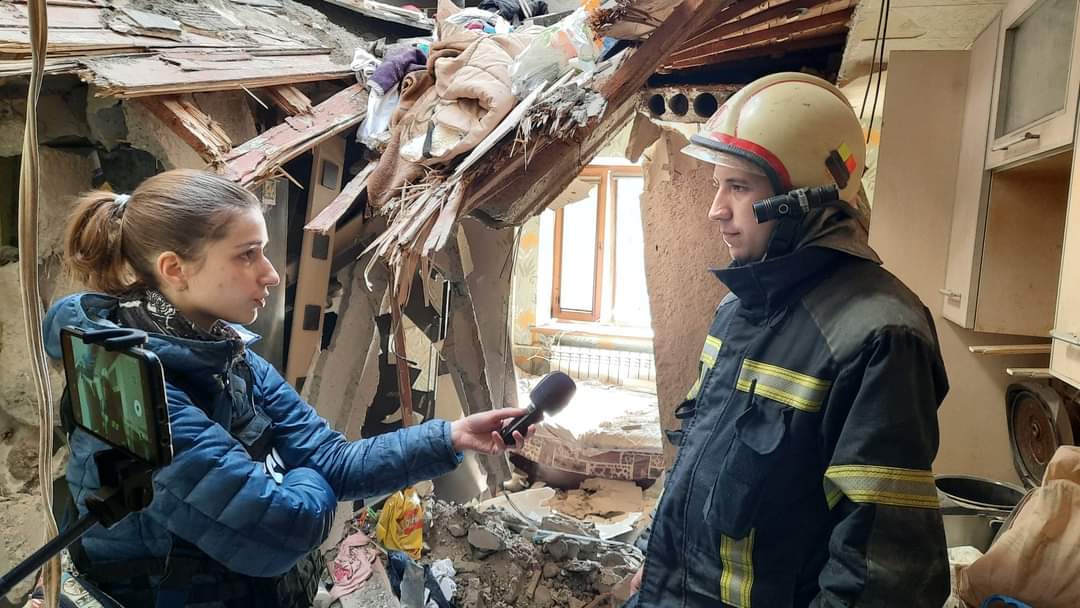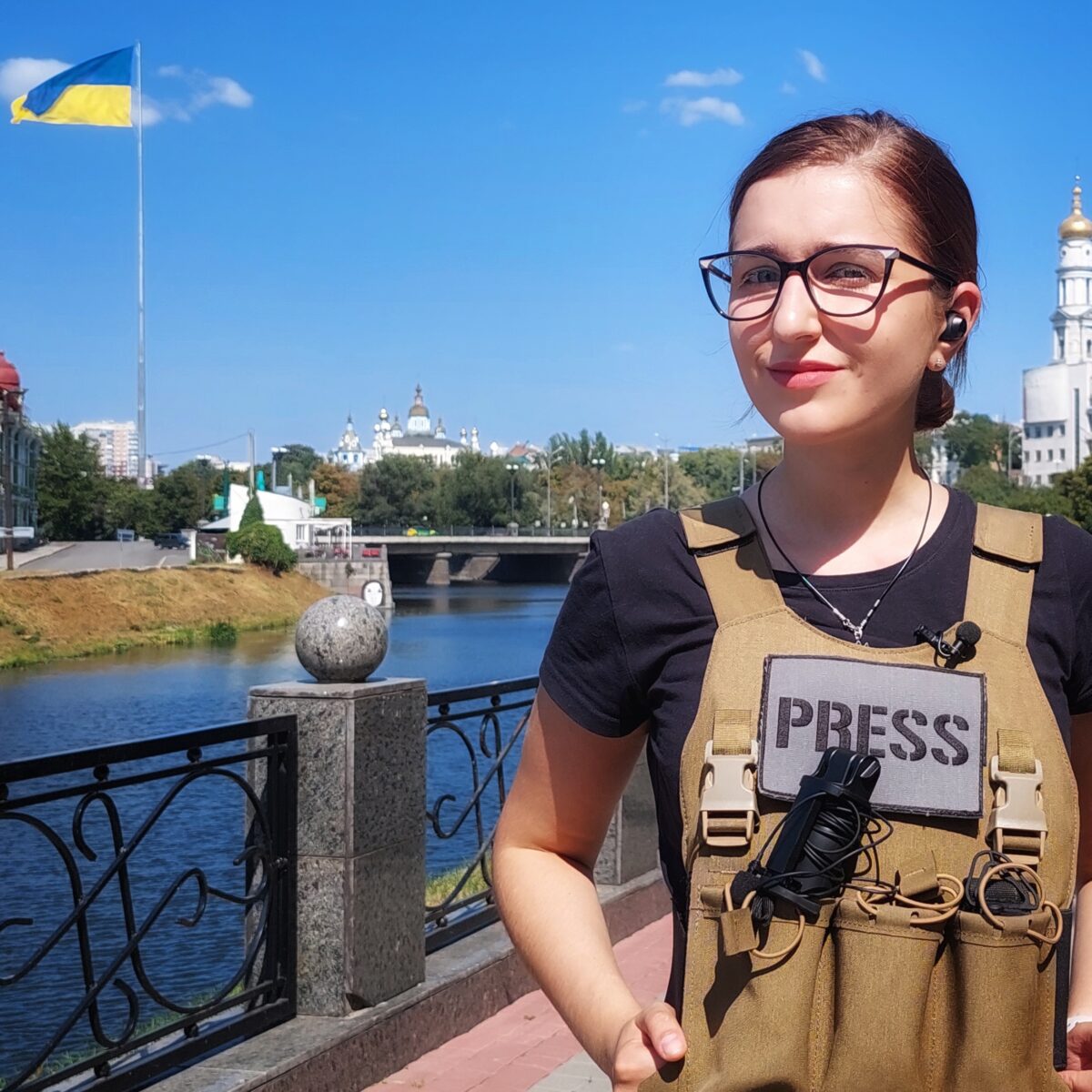For October 2022’s issue of The Leading Question, we sat down with Ukrainian journalists Oleksandra Novosel and Stanislav Kozlyuk to talk about the impact of the war on the lives of local journalists.
Ms. Novosel works for the Ukrainian Public Broadcast Service and Mr. Kozlyuk works for the Times of London. The interviews were done separately and have been slightly edited for brevity and clarity.
Where are you currently based?
Mr. Kozlyuk: I’m based in Ukraine; currently living and working from Kyiv. However, I’ve been based in different cities – Kharkiv, Odessa, and Mykolaiv, among others. When the full-scale invasion began, I was in Bakhmut – this little old city in the Donbas region. My first day working for the Times of London was the day of the invasion. We wanted to write a story about lives on the frontlines of the conflict in Donbas. Of course, our plans changed when the invasion started.
Ms. Novosel: I live and work as a journalist in Kharkiv, for the Ukrainian Broadcasting Service. I was here when the invasion began.

“As prepared as you can be in your mind, you can never imagine that a huge war will start in your country.”
Stanislav Kozlyuk
What were your beats before the invasion?
Mr. Kozlyuk: I didn’t start my career as a journalist. I actually had always wanted to be a radio DJ and worked at a local station in Kyiv. After doing that, I decided I wanted to pivot to journalism. I wrote a few stories and got a job with a Ukrainian magazine here in Kyiv. I’ve now been a reporter for 10 years and I’m also doing photojournalism.
I’ve always reported on the conflict between Ukraine and Russia. I started reporting in Donbas in the summer of 2014, shortly after areas were liberated from Russian-backed separatists. I wrote my first story on that. From then on, I stayed and kept covering the war from the frontlines. Before the invasion started, I also reported on police reforms and court hearings.
Ms. Novosel: Before February, I worked as a news producer and news presenter, primarily focused on politics. Now, I don’t work as a presenter anymore. I’ve had to become a journalist, a producer, and an editor. It’s very important to be able to do it all now.
Were you prepared for this war? How has your work changed?
Mr. Kozlyuk: Yes, I think I was prepared. The Institute of Mass Information (an Internews partner in Ukraine, ed.) has been so helpful to Ukrainian journalists – giving us free flak jackets and first aid kits. It’s really helpful. I got three helmets, three jackets, and two medical kits. But as prepared as you can be in your mind, you can never imagine that a huge war will start in your country. You can’t equate it to the scale of the conflicts of the past. The Russians are now using cruise missiles, tanks, jets, missiles, helicopters, and paratroopers. Everything’s changed. This is a clash between two massive armies. The risks are higher than in previous years.
Ms. Novosel: Everything has changed for everyone. We wake up to the sound of bombs. When it started, I told my family to leave the city for safe territory. I stayed because I knew this work would be important for people. I called my editor in Kyiv and said that I was going to stay. My entire team stayed, it’s important for people in Kharkiv and the region; they don’t know what’s happening. We didn’t have time to adapt. We just woke up and understood that we were in a warzone. Two months after the start of the war, me and my colleagues attended a training about emergency medicine and safety tactics for journalists.
Why did you decide to stay?
Mr. Kozlyuk: The question for me was never about staying. It was whether I should continue my work as a journalist, go to the volunteer camps to help people, or join the army. After a few days of the invasion, I knew I had to continue writing and taking photos. I’m in Ukraine, this is our war, and we must cover it. I must show what’s going on. I must stay.
Ms. Novosel: I was a reporter before the war, as I mentioned. But I was a civilian reporter who focused on the city and region. Today, I don’t call myself a war reporter. I don’t go to work in the war; I live in the war. There is constant bombing near my house. I stay in metro stations often because it’s safer. We have no choice, we must do this work. It’s not only our work, it’s for our country. It’s for our lives.

“We have no choice, we must do this work. It’s not only our work, it’s for our country. It’s for our lives.”
Oleksandra Novosel
What has been the most difficult part so far?
Ms. Novosel: It’s difficult to think of what has been the hardest for me. There is so much death, every day. In terms of the work, we know it’s important to document what’s happening with photos. There are bombs everywhere. We run out, take a photo, and run back to shelter or a metro station to send the photo out. We know that we must document these crimes and tell the world what’s happening.
We’ve had war here for years, but this war is unique. And there are so many examples of very good people, wonderful people, who are coming to help. People go to bombed sites to search houses for people and pets to rescue. Citizens of other countries fly in to help the relief effort. We have so many inspiring stories.
In addition to personal safety, what are some other issues that journalists are facing when covering the war?
Mr. Kozlyuk: You now see thousands of journalists from around the world coming to Ukraine. Everyone wants to go to the frontlines, which is risky. Some journalists have made mistakes on the frontlines, for example exposing the location of Ukrainian troops. It’s become easier for Ukrainian journalists to access areas and people that foreign journalists can’t; we speak the same language and many of us have been working on the frontlines in the East for years and years. We are more trusted by the military.
Everyone also wants to photograph human remains as evidence of Russian crimes. Entire cities are completely destroyed – is that not enough evidence? Many of my colleagues don’t care about these concerns, and that’s a problem.
Then you have the massive problem of social media rumors spreading. There has always been Russian propaganda, but now you have rumors exploding every moment on Telegram and other social media. Journalists have to separate it from the truth and explain what’s going on.
What are the primary needs of Ukrainian journalists today?
Mr. Kozlyuk: The main problem right now is money. It’s very expensive to work on the front lines. COVID had already smashed the news advertising market. This has only gotten worse since the war, as has the rate of inflation. It’s very hard for us. Some outlets find donors from the West, like NGOs and governments that support media work in Ukraine. And this is really helpful for us.
Ms. Novosel: We want to visit our relatives, our friends, and to just sleep. We’ve had attacks for months now; no one has slept.
What is your connection to Internews?
Mr. Kozlyuk: I spent a few days with Internews in 2014, in a training about covering the war. As you know, the Institute of Mass Information is working with Internews too. I sometimes help them with their projects, and they help with mine. This support is very helpful.
Ms. Novosel: All journalists in Ukraine, I think, know about Internews, because we know that Internews is helping – my team and I have equipment from Internews. That help is very important. It’s so good to know that people in other countries want to help us.

“That help [from Internews] is very important. It’s so good to know that people in other countries want to help us.”
Oleksandra Novosel
What keeps you going during this incredibly difficult time?
Mr. Kozlyuk: I can’t stop. I’m Ukrainian and I must live as a Ukrainian in this war. I know what I have to do.
Ms. Novosel: All of Ukraine knows that we will win. We don’t know how long it will take or how many times we will have to win, but we know that we will. We think about the safety of our families and friends. But in our profession as journalists, in these months, we have another family: our team.
This interview appears in the first edition of Internews’ newsletter The Leading Question. Read the first edition here and learn more about The Leading Question here.